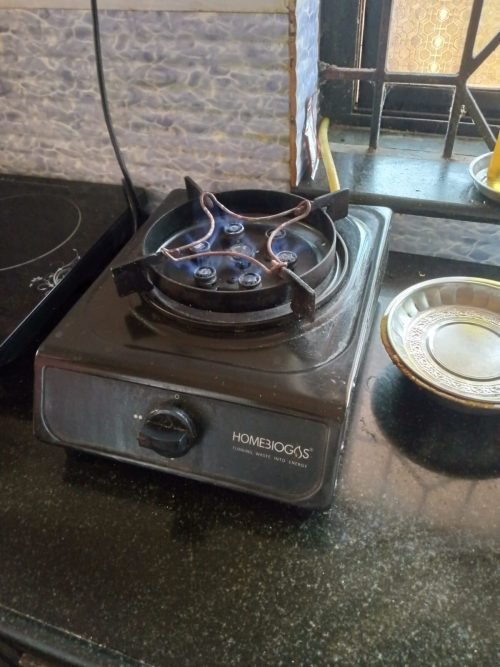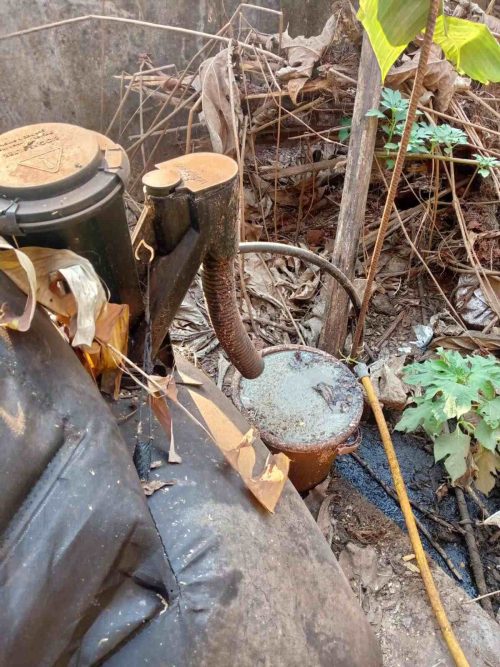This Biogas Plant in Goa’s Haturlim Village Is the First of Its Kind, Processes 5 Kg of Waste Daily
In a remarkable step towards sustainable living, Rupesh Chopdekar and his family from the remote village of Haturlim in Mayem have successfully installed a home biogas plant, setting an inspiring example for others in the State. This initiative has not only reduced their household waste but has also generated clean cooking gas for their daily use.
The Chopdekar family is the only household in Goa to have installed a home biogas plant, joining the ranks of just two educational institutions — Shiroda College and Arambol College — that have adopted similar systems.
 Approved by the Union Ministry of New and Renewable Energy (MNRE), the plant can process about 5 kg of kitchen waste daily (excluding eggshells), generating up to two hours of cooking gas. F
Approved by the Union Ministry of New and Renewable Energy (MNRE), the plant can process about 5 kg of kitchen waste daily (excluding eggshells), generating up to two hours of cooking gas. F
According to Chopdekar, the biogas plant has been operating smoothly for over a year without requiring any maintenance. The plant, installed outdoors, functions effectively under both sun and rain, eliminating the need for special shelter or additional care.
“Before installing the plant, we studied its operation and were convinced of its benefits,” Chopdekar explained. He credited the New India Multipurpose Cooperative Society (NIMS) in Mapusa, particularly Managing Director Samir Morajkar and Chairman Adv. Tanaji Sawant, for their support in facilitating the installation.
The home biogas plant has a capacity of 2 cubic metres and costs Rs 65,000, with a subsidy covering nearly half the cost. Approved by the Union Ministry of New and Renewable Energy (MNRE), the plant can process about 5 kg of kitchen waste daily (excluding eggshells), generating up to two hours of cooking gas. For every 5 kg of waste, an equal quantity of water must be added.
The plant offers significant savings for families, reducing their LPG consumption by half. Additionally, it produces approximately 5 litres of nutrient-rich slurry each day, which is highly beneficial for plants.
 The plant, installed outdoors, functions effectively under both sun and rain, eliminating the need for special shelter or additional care.
The plant, installed outdoors, functions effectively under both sun and rain, eliminating the need for special shelter or additional care.
Rajesh Gauns, the NIMS installation in-charge, explained that the initial setup requires around 150 kg of cow dung and 1,000 litres of water to create a culture of anaerobic bacteria. “This is a one-time process. Once the bacteria are established — usually after three weeks — kitchen waste can be added regularly,” Gauns informed.
The biogas plant has an estimated lifespan of 15 years, but it is believed to last even longer with minimal maintenance. Chopdekar emphasised that since its installation, the plant has operated without issues and has only delivered benefits.
“Our ward residents have become more aware of proper waste disposal. People who once discarded their waste on the roadside are now bringing it to our plant instead, having realised its value,” Chopdekar said.
He highlighted the absence of odour from the plant, as all processes take place in a sealed environment. Farmers, too, can benefit by using cow dung instead of kitchen waste. For every 20 kg of cow dung mixed with an equal amount of water, the plant can produce approximately 40 litres of slurry.
Gauns noted that a larger version of the plant, with a 7 cubic metre capacity, can process up to 12 kg of wet waste daily, generating four hours of cooking gas and around 30 litres of slurry. This larger unit costs about Rs 1 lakh.
The methane gas produced by the biogas plant is a clean and eco-friendly alternative to LPG. Gauns assured that the plant is designed using eco-friendly, rat-resistant materials, ensuring durability and security even when filled with waste and gas.
Reflecting on their experience, Chopdekar expressed satisfaction with the plant’s performance. “In one year, we’ve had no problems, only benefits — clean energy for cooking and nutrient-rich slurry for our plants. Initially, we installed it as a trial, but we soon realised its long-term value, and it has now become an essential part of our home,” he said.
Chopdekar believes such biogas plants can play a crucial role in addressing Goa’s growing wet waste issue while reducing dependence on LPG.
“The burden on large garbage treatment facilities can be reduced if more families adopt such home-based solutions. This initiative can significantly contribute to keeping our villages clean,” he added.
News